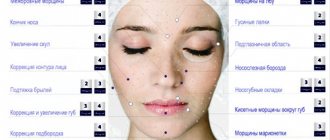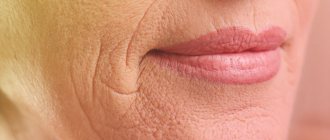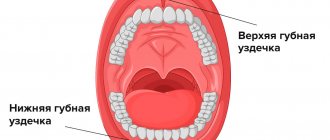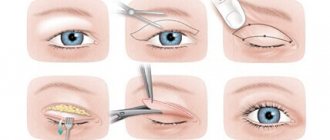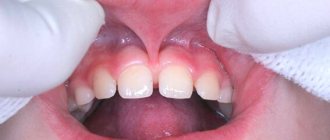Sometimes it can be difficult to understand what makes a face beautiful. Almond-shaped eyes, a regular nose or prominent cheekbones...
To determine the degree of attractiveness of a face, we use a mathematical method. As part of the harmonizing approach developed by Andrei Iskornev, in our clinics we calculate the exact proportions between individual parts of the face that make us more attractive.
It turns out that the distance between the upper lip and the nose is of great importance. Ideally, it should be no more than a quarter of the distance from the nose to the chin and range from 12 to 18 millimeters.
What is bullhorn cheiloplasty?
Bullhorn lipplasty is a plastic surgery, one of the types of cheiloplasty.
If we use medical terminology, a bullhorn is a subnasal surgical lift, the purpose of which is to reduce the distance between the nose and upper lip. This allows you to enlarge the upper lip and reduce its skin part.
The name of the procedure comes from the English bull's horn: a small incision in the fold under the nose is shaped like bull's horns.
Since reverse correction of bullhorn results is practically impossible, we at Platinental approach the planning stage very carefully. Before surgery, we take a series of anatomical facial measurements to calculate your individual beauty formula.
After all, the goal of this operation is not just to enlarge the upper lip. The goal is to make your lips sensual and your face more attractive.
The point is that there should be a place for lips on the face. And if the distance from the base of the nose to the upper lip is small, especially in combination with a drooping tip of the nose, we often recommend another correction method.
When forming the incision, we repeat the shape of the base of the nose so that the seam after the operation is carefully hidden in the fold underneath it.
Using a special microsurgical technology and without tissue tension, we form the thinnest possible suture, which after healing becomes no thicker than a human hair.
Postoperative period
In the first few days after surgery, you may experience swelling, numbness, tightness, and pain. The swelling is temporary and gradually goes away over the first few weeks after surgery. To speed up the subsidence of swelling, we recommend contacting one of our dermatologists.
In five to seven days you will be scheduled for your first follow-up examination. But you can contact us earlier if you wish.
Approximately three weeks after surgery, physical activity in the gym is allowed. The healing process for each patient is individual. Listen to your body's signals, follow them! However, it is recommended to avoid direct sunlight on the externally visible incisions used in labiaplasty for six months.
When is lip surgery needed?
Bulhorn upper lipplasty is used to bring the distance between the upper lip and the nose to harmoniously perfect proportions. Therefore, the indications for surgery are very diverse:
- Lip augmentation.
After surgery, the thin upper lip gains more volume and sensuality.
- Strengthening the cupid's arch.
Since the operation is aimed only at the middle part of the upper lip, it allows you to create a pronounced cupid's arch and make your lips sexier.
- General facial rejuvenation.
Over time, the lips become thinner and longer, and the distance between the tip of the nose and the upper lip increases. The bullhorn lip lift significantly rejuvenates the lower third of the face.
- Harmonization of appearance.
The fact is that an increased disproportion between the nose and upper lip, even on a young face, is perceived by our subconscious as a sign of age. Normalizing this parameter returns youthful features to the face.
- Beautiful open smile.
The correct distance between the nose and upper lip is not only responsible for attractiveness. Due to the nature of the bite, the upper lip may hide the upper teeth. This smile looks closed and the teeth appear short.
Bulhorn allows you to get a correct and beautiful smile when, at rest, the upper lip exposes the front incisors by 1/3, and when smiling, it opens the teeth of the upper row.
Indications for use
The operation is necessary in the following cases:
- in the presence of congenital defects
- for post-traumatic and post-burn disorders in this area
- in the presence of neoplasms of various origins
- if the patient wishes, change parameters such as volume, contours, shape.
In the presence of pronounced defects, the appropriateness of intervention is beyond doubt. Reconstructive cheiloplasty is aimed at restoring the aesthetic appearance of the face and psychological comfort of a person, which is a direct indication for manipulation. Cosmetic interventions are carried out by our experienced plastic surgeons in Podolsk both to increase and decrease the volume of the red border, if necessary, to change its shape, improve condition and appearance, that is, they have indirect indications for the use of a high-tech surgical method - cheiloplasty. Feedback on the reconstruction completed complements the overall picture of the entire process.
The volume and type of operation is determined by the plastic surgeon directly after a thorough examination, assessment of the initial state of the area where correction is planned, but is always agreed with the patient, who must sign an informed consent to receive such a service with photographs taken before and after the operation.
An essential aspect of such an intervention is its price, which varies significantly depending on the type of correction, the qualifications of the surgeon and the location of the procedure.
We pay special attention to the formation of invisible seams
The bullhorn scar is located in the visible part of the face. To disguise it, we at Platinental use a number of proprietary developments and tricks that we have accumulated over a long period of practice.
For example, we make an incision under the nose so that after healing it is securely hidden by the anatomical structures of the nose and falls out of sight. We perform fixation and suturing of the scar exclusively using microsurgical techniques. Due to this, the scar after bullhorn turns out thin and practically invisible.
If a small scar is still embarrassing, we perform laser resurfacing of the scar. But, as a rule, this is not required.
Expert comment:
“Bullhorn is not as simple an operation as it looks at first glance.
Before conducting it, I always take into account the rules of harmony and proportions of the golden section. My experience shows that to correct a smile and enlarge the upper lip, it is enough to remove literally 1-2 mm of skin.
Even with a strong desire to get plump lips, excision of a wide flap for bullhorn is contraindicated. On the one hand, this is fraught with excessive inversion of the mucous membrane, which cracks and becomes inflamed. On the other hand, a short distance between the nose and upper lip destroys attractive proportions and adds several years to the face.
Choose your bullhorn surgeon carefully. Do not forget that this operation is performed in the area of the most visible part of the face, and it is almost impossible to correct its results. There is no point in taking risks; correcting bad work in this case will be very difficult and expensive.”
Maxim Vasiliev, plastic surgeon.
Anatomical and physiological features of the studied area
Lips are a muscular organ that takes an active part in the processes of chewing, articulation, facial expressions, therefore no operation, be it surgical cheiloplasty or injection, should worsen these processes.
The folds framing the mouth opening are formed by several layers of tissue:
- Internal - mucous layer has a rich blood supply
- The middle layer is muscular, formed by the plexus of the orbicularis oris muscle, the levator muscles of the upper movable edge of the mouth, the depressors of the lower part, the corners of the mouth, and the zygomatic muscles.
- The outer layer is made of skin. Most of it has a red color, due to the closely located capillary network, and is called the red border. It is its quality that influences the decision to perform an operation, its cost and degree of complexity. Red terminum borders the mucous membrane on one side and the skin of the face on the other.
This structure determines the possibility of performing an operation, that is, the point of application of surgical interventions. Due to enhanced vascularization (blood supply), this area has a high ability for tissue regeneration; cosmetic postoperative scars in a given area are almost invisible after healing.
Subcutaneous tissue located in the red border area facilitates easier separation of the layers from each other, which allows you to change the shape of the lips. Having access from both the external and internal sides allows the surgeon to vary approaches to the operation in order to ensure a high level of aesthetics of the cheiloplasty procedure. Before and after photos provide significant assistance in assessing the result.
For such a direction as surgical cheiloplasty, the appearance of the mouth area plays an important role. Photos before changes can help you see existing flaws more clearly.
A person's mouth has certain contours that determine their attractiveness. Compliance of size and shape with generally accepted beauty standards can be assessed by a doctor during the initial examination.
From the side of the lower lip, attention is drawn to the fullness, degree of curvature, and symmetry of the outer edge. The cost of changing it is lower. The upper one has a more complex terrain. It has the so-called Cupid's bow - an M-shaped bend in the center. Its location relative to the nose and the degree of convexity also significantly affect the overall appearance. In addition, when performing surgical procedures, factors such as:
- age
- degree of change in surrounding tissues
- correct bite
- character of tooth growth,
since they are directly related to the preservation of not only aesthetic parameters, but also the basic physiological functions of the organ. Only an integrated approach to the choice of surgical intervention gives positive feedback.
Bullhorn varieties
The bullhorn operation is not always performed according to the same scenario. It has several modifications.
1. For example, there is the so-called internal, or VY bullhorn , when during the operation additional hidden incisions are made in the upper lip from the mucosal side.
The surgeon performs 2 incisions of the upper lip in the shape of a V followed by suturing in a Y shape. This method allows you to enhance the effect of plump lips and get a very natural result.
2. There is also an " Italian bullhorn ". In this case, the incision is not made in one continuous line, but consists of two small incisions to the right and left of the columella.
The advantages of this option include the fact that the scar under the nose after such a procedure is practically invisible. The downside is that this method will not lift the upper lip significantly.
Anesthesia
To make the surgical procedure more comfortable, step-by-step local anesthesia is performed first on the mucous membrane of the lips, then by injection of analgesics to turn off sensitivity in the area of innervation of the mental, infraorbital and palatine branches of the trigeminal nerve. For this purpose, solutions of lidocaine mixed with adrenaline are used.
In particularly difficult cases, the intervention is performed under general anesthesia. The cost of intraoperative anesthesia at the Solei Plastic Surgery Clinic is always included in the stated price of a particular cheiloplasty method.
Is it possible to do non-surgical bullhorn?
To enlarge the upper lip without surgery, it is enough to do lip augmentation with hyaluronic acid. However, lip correction with fillers is not always suitable for a number of reasons.
Firstly, to maintain lip size, fillers need to be pinned about twice a year.
Secondly, with initially thin lips, fillers cannot significantly affect their size.
Thirdly, what we talked about from the very beginning, the root of age-related changes in appearance most often lies not in the lips themselves, but in the increased distance between the upper lip and the nose. It is this problem that non-surgical correction cannot solve.
Contraindications
Direct contraindications to intervention are:
- inflammatory diseases of the area where surgical intervention is expected (presence of herpetic eruptions, purulent wounds)
- general somatic diseases that interfere with both the progress of the operation and normal healing processes. Such ailments include diabetes mellitus, damage to the immune system, blood clotting disorders, heart or vascular disease.
Relative restrictions on the use of such an intervention as cosmetic plastic surgery include:
- age up to 18 years (due to the incompleteness of the processes of formation of the maxillofacial apparatus and the deontological aspects of the procedure to change appearance)
- These manipulations should be approached with caution if the patient has a burdened allergic history.
Is special training required?
At the first consultation, the doctor collects the patient’s medical history, chronic diseases, allergic reactions, and general health are important. It is also necessary to pass standard tests - a general blood test, urine test, coagulogram, markers for HIV, hepatitis, ECG. A consultation with an anesthesiologist is required; surgery involves the use of general anesthesia. In some cases, local anesthesia is possible, depending on the indications for the procedure, as well as the individual characteristics of the patient.
Preparation for the event:
- one month before the scheduled surgery, you need to complete antibiotic therapy;
- do not take alcohol, analgesics, aspirin for 10 days;
- limit physical activity, visiting the gym, sauna, solarium, swimming pool;
- the day before you need to take a bath;
- On the day of the test you cannot eat, drink or smoke; you must thoroughly brush your teeth and rinse your mouth.
Advantages and disadvantages
Before deciding to undergo surgery, it is worth weighing all the advantages and disadvantages.
Pros:
- the result of the correction can be assessed almost immediately;
- lasts no more than an hour;
- allows you to perform complex lip correction, get rid of delicate skin wrinkles, cope with defects and pathologies;
- the effect lasts for life;
- the patient can decide which shape and volume to choose.
Minuses:
- long postoperative period;
- there are risks of complications from side effects;
- high price;
- an impressive list of contraindications.
Possible side effects and complications
During the first 5 days, pain may be observed; to reduce discomfort, the doctor will recommend painkillers. Swelling and hematomas are natural consequences after surgery, go away on their own, and persist for about 2 months. Other complications of surgery are also
- feeling of skin tightness;
- temperature increase;
- bleeding;
- impaired sensitivity due to damage to nerve fibers;
- allergic reaction;
- inflammation.
Attention! Repeated surgery is performed in the presence of scars, scars or unsatisfactory effect of the first correction. It is prescribed after 12 months, when the result of vy plastic surgery can be objectively assessed.

